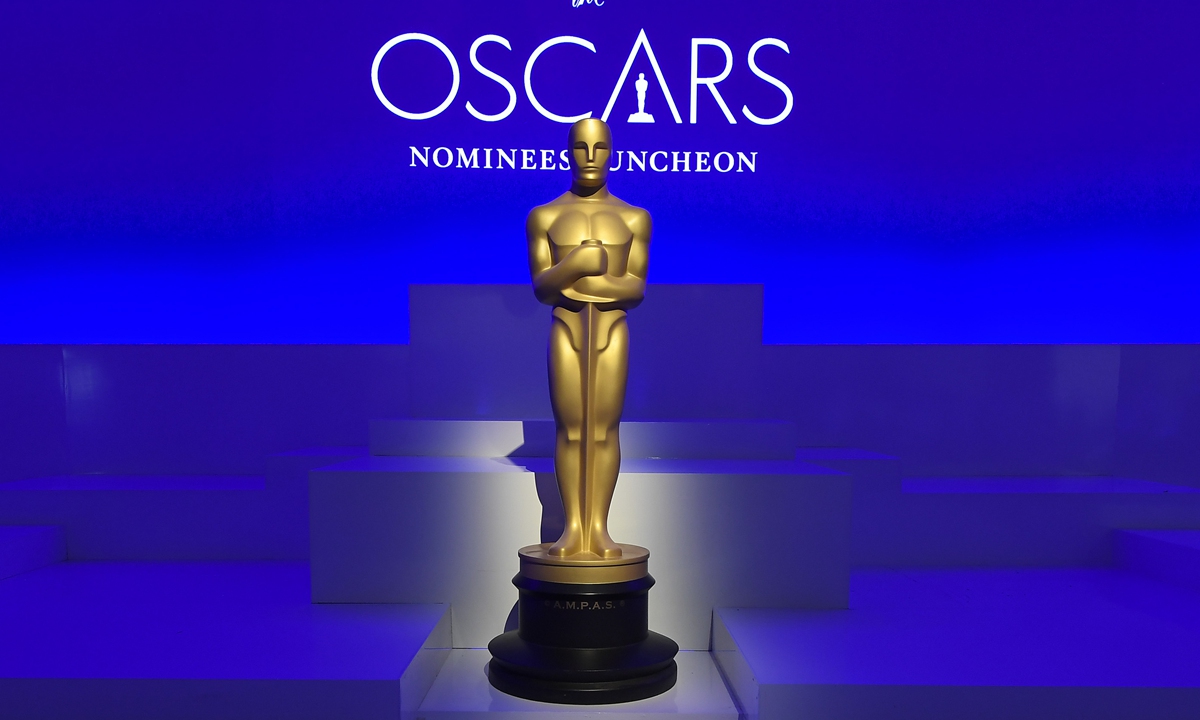
Photo: VCG
The Oscars on Sunday will mirror the movie industry they honor: transformed by the pandemic, forced to experiment with new venues and formats, and likely to be dominated by Nomadland.
The crowning event of Hollywood’s awards season was delayed by two months, and will mainly be held at Los Angeles’ Union Station, chosen for the social distancing its enormity allows in the age of COVID-19.
In a nod to the year 2020’s unique circumstances, the 93rd Academy Awards will have a large footprint – the presentation of honorary prizes and musical performances will take place at a Hollywood theater and the Academy’s new film museum, while Europeans unable to travel will gather at “hubs” in London and Paris.
But the main business of handing out golden statuettes will take place at the station – with one particular film expected to depart with a handful including best picture, the night’s final award.
“I can’t imagine that Nomadland does not win the big prize. I can’t imagine that Chloe Zhao doesn’t win for director,” Variety journalist Marc Malkin told AFP.
“But I always say about this year – this year has been so weird. You just never know.”
‘Total lock’
Zhao’s elegiac road movie about older Americans roaming the West in vans after the global financial crisis won top film festival prizes in fall and has dominated the elongated and largely virtual awards season.
The 39-year-old Beijing-born director is “a total lock – they’re going to vote for her even if they haven’t seen the movie,” said Deadline awards columnist Pete Hammond.
“Right now, she’s very respected and much beloved in the directing community,” one Academy voter, who asked not to be named, told AFP.
If any film can rival Nomadland, it may be The Trial of the Chicago 7, which won the top prize from Hollywood’s actors guild.
That would hand Netflix the industry’s biggest accolade for the first time, in a year of shuttered movie theaters that was ruled by streaming.
“It’s not inconceivable, but I don’t get the vibe out there for it right now where it’s going to pull this off,” said Hammond, pointing to #MeToo revenge thriller Promising Young Woman and immigrant drama Minari as dark horses.
‘Hopkins lurking’
Nomadland star Frances McDormand, a two-time Oscar winner who anchors a film in which several real-life “nomads” play versions of themselves, is nominated once again this time.
But that category is “up in the air” and “could go any which way,” said Hammond, noting that all five contenders including Viola Davis (Ma Rainey’s Black Bottom) and Carey Mulligan (Promising Young Woman) have won major awards in the run-up to the Oscars.
Davis’s co-star Chadwick Boseman, who died in 2020 from cancer before the release of his tragic final performance as a trumpet player haunted by racist atrocities, is tipped to win the third-ever posthumous acting Oscar.
“I would probably put my money on Chadwick, but there could be a surprise,” said the Academy voter.
“Anthony Hopkins is lurking in the background,” the voter added, referring to the Oscar-winner’s shattering performance as a dementia sufferer in The Father.
Daniel Kaluuya is expected to win best supporting actor for Judas and the Black Messiah, while South Korean actress Youn Yuh-jung’s popularity has grown with her “endearing” recent acceptance speeches for other supporting actress awards for her work in Minari, said Malkin.
It is realistically possible that all four acting prizes – and director – could go to people of color, while Netflix is expected to scoop the most prizes of the night, including for best documentary for My Octopus Teacher.
‘Opportunity’
The ceremony will be pared back – producers have spoken of a guest list so strict that even Hollywood’s most powerful studio executives won’t be allowed in, and a “teeny-tiny” red carpet that could pose some challenges.
“The few interviews that [the] talent are doing at the Oscars, they’re doing from seven feet away,” said Malkin.
“That’s just awkward… how do you do that? How do you make it fun?”
But the show’s co-producer, Oscar-winning director Steven Soderbergh, has described the COVID-19-mandated changes as an “opportunity” for a show unlike “anything that’s been done before.”
The ceremony will have “the aesthetic of a film as opposed to a TV show,” including movie-like “over-the-shoulder shots from within the audience” and high-resolution, widescreen formats, he said.
Stars have been asked to dress to the nines – and reportedly can remove their masks when cameras are rolling. A-list presenters include Harrison Ford and Brad Pitt.
“Kudos to the Academy for at least trying to have some semblance of a live show, without Zoom,” said Hammond.
But the lower profile of this time’s nominees and pandemic-era screen fatigue mean the Oscars are all but certain to suffer the same precipitous ratings drop of other awards shows.
“It would be a wonderful day for the Academy if it only drops 50 percent,” he told AFP.
“It’s just the way it’s going,” he explained.






